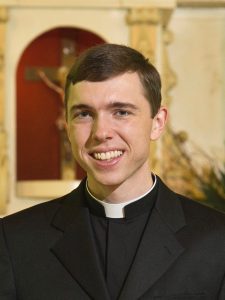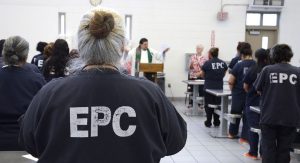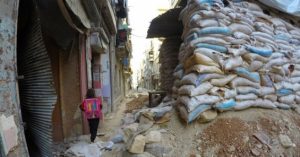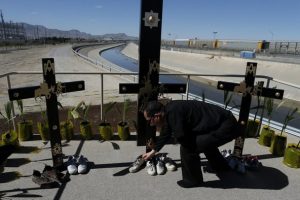I am a Jesuit scholastic at Loyola working toward an MA degree in English Literature, and I also take graduate classes in philosophy and theology. I chose to study Arabic as a way to make myself available for a possible future assignment in the Middle East.
This summer I spent seven weeks in the border city of El Paso, Texas. One of my main goals, which I had discussed with my superior in making my decision to go there, was improving language fluency—in Spanish. It was not an environment in which I expected to be speaking any Arabic. As a border city, El Paso sees many migrants passing through. Immigration and Customs Enforcement (ICE) has a detention center there, and one of the Jesuits in town, Fr. Rafael, would go about once a month to say Mass for the detainees; other priests in the area would take turns as well. I had the chance to go with Fr. Rafael twice when he went to say Mass.
At the detention center, I met a woman who was a refugee from the Syrian civil war. She spoke very little English, so I had to make do with my elementary Arabic. She of course was speaking a local dialect, but with patience and persistence—she was quite patient with me—I was able to learn the basics of her situation. Her name was Maha, and she came from a town called al-Kafroun. She had arrived at the US border from Mexico, and had travelled there with her son, Tariq, who was also in the detention center. Her husband and her daughter, whose names I did not learn, were still in Syria. The fact that they were still in Syria, without any way to contact Maha, was clearly a source of distress for her.
I struggled in speaking with Maha because of my limited Arabic. Other than listening, there was very little I could concretely do to help her. Maha had been in the detention center six months and had only just had her first hearing in immigration court; there was nothing I could do to speed up her process. Yet it was not a situation devoid of hope. Maha was incredibly grateful to have someone to speak with in her native tongue—even if that someone spoke poorly, like a little child. Most importantly, we could pray together. I stayed next to Maha during Mass, and together we participated in that greatest of Christian prayers—she in Arabic and I in Spanish. When I had the chance to return another day during visiting hours, I did my best to converse with her, and when I had reached my limit, we said the Our Father and Hail Mary together in Arabic. Those moments when we were together beseeching God for mercy were the most important.
I have continued to pray for Maha and her family since I left El Paso. Her faith, so strong in the face of great adversity, has been an example to me. I pray that she may be safely reunited with her family, and I hope that we here in this country might extend a hand of mercy and compassion to the many others—from Syria, Latin America, Africa, and around the world—who are fleeing the horrors of war and violence.




